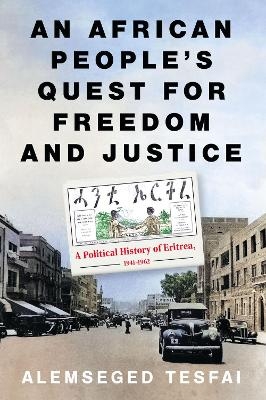
An African People’s Quest for Freedom and Justice
A Political History of Eritrea, 1941–1962
Seiten
2025
C Hurst & Co Publishers Ltd (Verlag)
978-1-911723-79-0 (ISBN)
C Hurst & Co Publishers Ltd (Verlag)
978-1-911723-79-0 (ISBN)
- Noch nicht erschienen (ca. Januar 2025)
- Versandkostenfrei
- Auch auf Rechnung
- Artikel merken
A pathbreaking history of modern Eritrea under postwar international administration, shedding light on issues that rock the Horn of Africa to this day.
Like its African neighbours, Eritrea attained colonial statehood under a European power, in this case Italy. Yet, during decolonisation, its people were singularly excluded from the right to self- determination, for external reasons: superpower rivalry over the country’s strategic position on the Red Sea; a mistaken notion of irreconcilable sectarian differences within Eritrea’s population, invoked in order to brand it a society unfit for statehood; and Ethiopia’s imperial claim, based on mythical historical connections.
The Ethiopian call for Eritrea’s return, supported by the UK and the US, sealed its fate at the international level. First, in the early 1950s, the UN General Assembly federated Eritrea as an autonomous unit under Ethiopian sovereignty; a decade later, Addis Ababa annexed it as a province—in neither case was the population consulted, sparking a liberation war.
This vital book traces the genesis of the Eritrean independence struggle through hitherto unexplored local sources, both written and oral, analysed against the rather scanty existing literature on this period. Alemseged Tesfai refocuses the narrative on the actions, reactions and expectations of a relatively small nation, in both size and population, as it set out to right an international wrong, imposed by the Great Powers of the day.
Like its African neighbours, Eritrea attained colonial statehood under a European power, in this case Italy. Yet, during decolonisation, its people were singularly excluded from the right to self- determination, for external reasons: superpower rivalry over the country’s strategic position on the Red Sea; a mistaken notion of irreconcilable sectarian differences within Eritrea’s population, invoked in order to brand it a society unfit for statehood; and Ethiopia’s imperial claim, based on mythical historical connections.
The Ethiopian call for Eritrea’s return, supported by the UK and the US, sealed its fate at the international level. First, in the early 1950s, the UN General Assembly federated Eritrea as an autonomous unit under Ethiopian sovereignty; a decade later, Addis Ababa annexed it as a province—in neither case was the population consulted, sparking a liberation war.
This vital book traces the genesis of the Eritrean independence struggle through hitherto unexplored local sources, both written and oral, analysed against the rather scanty existing literature on this period. Alemseged Tesfai refocuses the narrative on the actions, reactions and expectations of a relatively small nation, in both size and population, as it set out to right an international wrong, imposed by the Great Powers of the day.
Alemseged Tesfai is a lawyer and historian. Born in 1944 in the southern Eritrean town of Adi Quala, he is also the country’s premier playwright. His drama The Other War was the first Eritrean play ever published, and the first to be translated into English.
| Erscheint lt. Verlag | 30.1.2025 |
|---|---|
| Zusatzinfo | 24 Illustrations, black and white |
| Verlagsort | London |
| Sprache | englisch |
| Maße | 156 x 234 mm |
| Themenwelt | Geisteswissenschaften ► Geschichte ► Regional- / Ländergeschichte |
| Geschichte ► Teilgebiete der Geschichte ► Wirtschaftsgeschichte | |
| ISBN-10 | 1-911723-79-0 / 1911723790 |
| ISBN-13 | 978-1-911723-79-0 / 9781911723790 |
| Zustand | Neuware |
| Haben Sie eine Frage zum Produkt? |
Mehr entdecken
aus dem Bereich
aus dem Bereich


